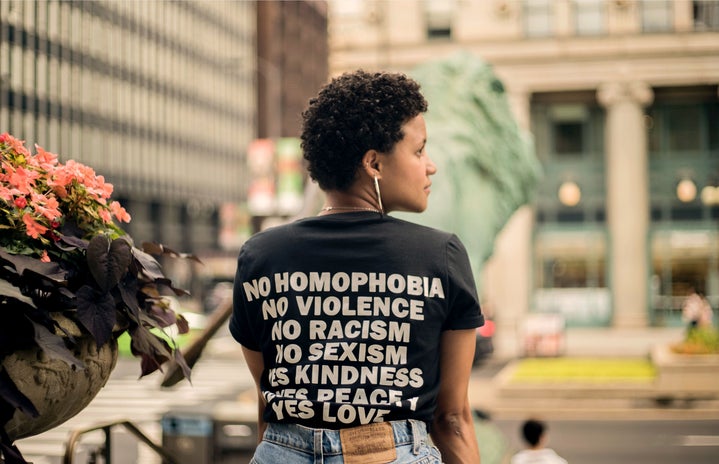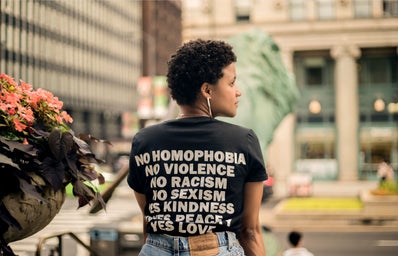Queering means taking back power that is rightfully yours from those who decided it should not be. It means changing the social structure or norms to fit changing opinions. For me, it means using my lens as a member of the LGBTQIA+ community, specifically a self-identifying queer/lesbian woman, to look critically at media and society. To queer in this sense can do more with asking the questions: Why do we assume heteronormativity? How would this story change if this character had “___” identity (queer, trans, gay, ace, etc.)? Why are we hesitant to include queer characters in traditionally “straight” or socially valuable narratives? By asking these questions when looking at any piece of media, I take my queer identity and try to form it into questioning the boundaries created by society. I put myself in the spaces that people previously decided that I, and others like me, should not be in. Academia is no longer about consuming media about dead, straight, cis-gendered, white people that I could never hope to identify with. Academia becomes something attainable to the masses instead of the select few.
Confining the term “queering” to only the LGBTQIA+ community limits how it can be used to expand our understanding of so many forms of media. I think it can be used to flip norms around in any way. It is the intersectional ability to reform preconceived notions into something we can use in our lives, at this time. Queering brings culture, race, sexuality, gender, ethnicity, religion, class, and so much more into the realm of media. By taking texts used to silence or tear down different types of people and making them fit us, we take back the power we naturally have as human beings. We all deserve to see ourselves reflected in the texts, movies, plays, etc. that we study and consume. Queering gives us that ability for ourselves and adds nuance to things previously accepted without question.
To queer anything means to give the marginalized a voice and the power that they lost. Queering the media that we are told is “great” and that we should consume to be valued members of society lets that media mean something more than a checkbox. People see themselves reflected in what they consume, can take lessons from it, and think more critically about other media in the future.
But what does this mean for literature? For me, it means that we should put more emphasis on queer literature and telling queer stories. Author and journalist Amelia Abraham put it beautifully when she said, “For many of us who are LGBTQ+, queer literature can provide solace, joy, a lifeline.” There is something important about seeing yourself in media when you are in your formative years. Especially if you are like me and Abraham and you grew up “with no examples of what it’s like to be LGBTQ+ within the home.” Not only is there a lack of normalized stories in the home, but there is a distinct lack of queer stories in general. We are forced to tell our own stories “because many of them were either never recorded or lost.” By not recognizing this history, we erase the deep history of LGBTQIA+ people that exists. Abraham states that because of this erasure, “literature has a lot of catching up to do.” She goes on to explain that as “rights are won, we find more ways to talk about our gender, and we learn to accept different types of love more freely”, and because of this “we will need more stories that reflect our ever-broadening experiences, but also show us what the possibilities are, as queer literature so vitally did for me.”
We have made so much progress in the sphere of LGBTQIA+ rights, but there is still so much to be done. We cannot accept that only a few of us have full rights and a tenuous grasp over our physical safety. We have to keep fighting back to normalize our space in literature, academia, and society. I believe that a vital way to do that is to tell queer stories via literature. Spreading the words and experiences of queer individuals keeps their voices alive with power and keeps conversations going about injustices and equality.


